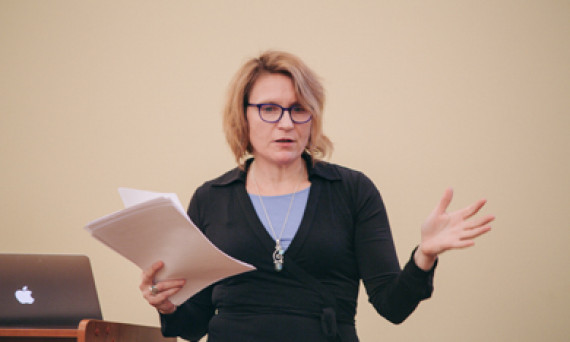On October 19th, as part of a Gender Studies program seminar, EUSP hosted a lecture by Laurie Essig (Middlebury College)
Climate change, global capitalism and the enthusiasm with which nations get involved in endless wars suggests that even if you meet the infamous and utopian prince on a white horse, no one can guarantee you’ll “live happily ever after.” We live, however, in an era when Disney instructs little girls on how a poor simpleton may become a princess, because she’ll certainly fall in love with a prince. With her new study Love Inc., Professor Essig tries to expose the ideology of romantic love, and in her lecture focuses on three key facts of romantic illusion.
Fact 1: Romance is a social construction. According to Essig, we learn to be romantic in the same way we learn to practice a particular religion, since romance is primarily a set of practices. Day after day popular culture produces clichés in the form of romantic comedies, love ballads and women’s novels, showing consumers of cultural production a similar stream of behavioral patterns. The state also regulates romance by deciding who has (or doesn’t have) the right to get married and to receive the privileges with which marriage is inextricably linked.
Fact 2: Romance is an invention of modernity. Of course the idea of romantic love is nothing new, though the story of Romeo and Juliet doesn’t sell us the idea of a cloudless and stable future, as do modern conceptions of so-called “true love.” Essig uses 1850 as a reference point for the capitalist-romantic era, when a woman from Massachusetts named Esther Howland began mass-production of the cards to mark St. Valentine’s Day, thus commodifying human emotions. Today, Americans spend 90 billion dollars a year supporting the romance industry, 70 billion of which goes to gifts for pets.
Essig believes that producing romantic relationships in such a form reinforces gender, race and class hierarchies as natural; romance is an ideology in the Marxist sense. From here follows Fact 3: The state is in bed with all of us. In the 20th century, rhetoric linking marriage to national power and stability intensified; sexuality outside of marriage, non-reproductive sexuality and interracial sexuality were all labeled as “degraded.” With the help of propaganda slogans communicating that love is all you (we) need, romance quietly became the new “opium of the masses,” breeding a discourse that only white, gender-normative, young, and beautiful people are worthy of this love.
An ideological turn in capitalism occurred in the 1980s was able simultaneously to hide the material effects of global capitalism and give people the opportunity to believe in a better future. For Essig, the idea of belief in a brighter future is manifested in the wedding industry. Despite the fact that the majority of couples planning a wedding already have educational debt (for many this reaches 100 thousand dollars), the costs of organizing a wedding often amount to 60 thousand dollars (the average cost of a wedding reception in the United States). Many couples that Essig interviewed said that these expenses represent to them the “right way” to marry, despite the fact that according to statistics the cost of a wedding is inversely proportional to the duration of marriage.
The logic of such behavior, says Essig, echoes the logic of the new romantic-capitalist ideology: if we sacrifice now, spending a huge fortune on the wedding, we will be happy. Expenses for romance become a guarantee that we will “live happily ever after.” Many couples postpone marriage until they can afford it, metaphorically postponing the purchase of their own happiness. Romantic ethics are accessible to us from a young age—through cartoons and movies—instructing us on how to behave, what to believe, and what to expect. The hegemony of romance distracts people from real problems such as race/class privileges, poverty, and unpopular political and judicial decisions. Romance affects all spheres of our lives, creating a situation of ‘cruel optimism,’ when the only thing that’s really necessary is realism.
Veronika Lapina











